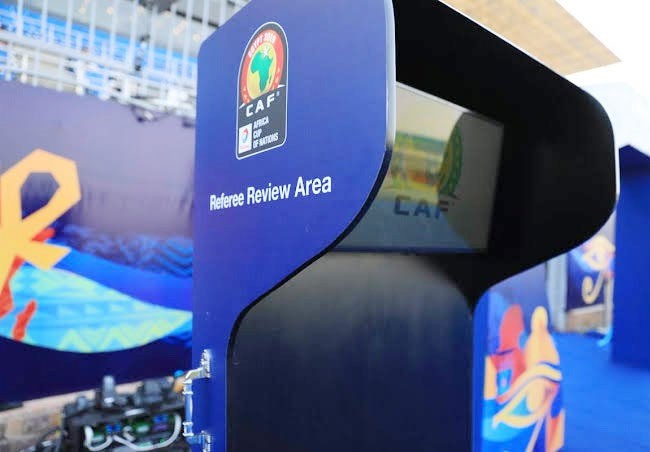January 28, (THEWILL) – The Video Assistant Referee (VAR) represents a technological innovation in football officiating, involving trained video officials reviewing decisions and advising on-field referees. Implemented to minimise human errors impacting soccer matches, this system was formally adopted by the International Football Association Board (IFAB) in 2018 after extensive trial phases across multiple competitions.
VAR addresses critical in-game incidents relating to goals, penalties, red cards and mistaken identity. Operatives utilise video footage and multiple camera angles to evaluate refereeing decisions, recommending reviews in case of potential “clear and obvious errors.” This technology aims to deliver accurate and equitable judgment, enhancing fairness crucial in a dynamic, fast-paced sport.
Yet, for many fans of the English Premier League (EPL), this has not been the reality. The EPL unrolled VAR in 2019 to curb officiating mistakes and contentious calls. However, teething troubles plagued early adoption, with inconsistent interpretations drawing widespread criticism. Ambiguity around review protocols and intervention thresholds fostered frustration, marring the promise of impartial technology-enabled justice.

Recent EPL history illustrates these grievances prominently across landmark matches. The January 14, 2023 fixture between Manchester rivals, United and City, encapsulated a typical VAR controversy. Marcus Rashford’s winner, seemingly offside, was awarded after a brief VAR check and on-field review. Despite upholding the goal, the decision ignited debates around interpreting offside rules and intervention timeliness.
The Arsenal versus Brentford match on February 11 offered a greater VAR fiasco. A goal allowed to stand due to an overlooked offside offence rightfully elicited an apology and consequences for the video assistant involved. Critics spotlighted human negligence nullifying VAR’s central advantage – eliminating bias through technology. Lee Mason, who was at fault, was forced to leave his role with the VAR team.
Crystal Palace’s encounter with Brighton & Hove Albion on the same weekend as the Arsenal case provoked similar outcry over another miscued offside call disallowing a legitimate goal. While errors are unavoidable, the Independent Panel Review’s strong critique highlighted deep concerns around accuracy reflecting on the competition’s integrity.
Chelsea’s September 3 contest against West Ham United presented additional dimensions to the VAR conundrum. A goal denied due to perceived foul play in the pre-scoring phase incited scrutiny over cause-effect interpretations. Despite match footage inconclusively evidencing said infringement, the VAR verdict emphasised prudent restraint in overturning on-field decisions to influence outcomes.
The Newcastle United-Crystal Palace clash on the same day saw a comparable scenario. VAR overturned the referee’s initial decision to award Newcastle a goal, citing a collision involving Joe Willock before the scoring moment. This intervention attracted allegations of excessive nitpicking, triggering the bigger question of how VAR should balance upholding laws and maintaining match flow.
Manchester United’s encounter against Arsenal on September 4 witnessed arguably the season’s most hotly contested VAR call. An Arsenal goal disallowed due to a foul in the buildup elicited vociferous responses from pundits and fans. Further intensifying emotions, the Independent Panel declared the VAR decision objectively incorrect, showcasing the subjective complexities in football regulation.
Tottenham Hotspur’s eventful bout with Brighton on April 8 encapsulated wider grievances around lengthy delays accompanying VAR reviews. A disallowed goal and rejected penalty appeals drew substantial post-match analysis over incremental offside interpretations and minimal contact fouls. While critics argued for maintaining on-field referee autonomy, others highlighted the need for clarifying VAR usage protocols to optimise the technology’s capabilities.
Scrutinising Brighton’s and Arsenal’s multiple matches reveals VAR’s inconsistent application across different fixtures featuring the same teams. Disallowed goals, overturned penalties and upheld disciplinary bookings produced contradictory outcomes, hampering consensus around standardised decision frameworks.
Liverpool’s tense victory against Aston Villa on May 20 presented another pressure-cooker VAR examination. Video confirmation of offside ruling out a Villa equaliser in stoppage time showcased razor-thin interpretations, provoking debates around perceived intentional touches from a natural playing position. Ultimately the Independent Panel deemed the interference judgement acceptable, despite discontent over context and common sense.
Examining Liverpool’s journeys across competitions portrayed VAR’s repertoire beyond attacking decisions. Disallowed goals due to offside or fouls attracted attention as usual. However, video reviews also influenced disciplinary outcomes, ranging from overturned yellow card decisions to confirmed red card offences. These diverse scenarios illuminated interpretation complexities when applying VAR across multifaceted match incidents.
VAR controversies even filtered into the FA Cup, evidenced by the January 29 clash between Brighton and Liverpool. A brutal Fabinho tackle only sanctioned with a yellow card despite red card clamours attracted eyeballs to the monitor. While inciting familiar frustration around subjective decisions, this event highlighted VAR’s incomplete scope in regulating unified foul punishments.
EPL fans will agree that recent EPL history underlines dissent across stakeholders regarding VAR’s capacity to achieve fair and transparent justice. Inconsistent decisions dictated by interpretation nuances rather than facts fuelled allegations about the technology itself being wielded as a subjective tool arbitrarily distorting match outcomes.
Mounting controversies threatened VAR’s credibility in resolving football’s perennial officiating challenges to the point that more than a handful of fans have asked for the technology to be scrapped.
However, the experience of VAR at this year’s ongoing Africa Cup of Nations in Ivory Coast has so far provided a different perspective and an intriguing counterpoint that positions competent and measured VAR usage. This has the tendency to generate fresh trust around refereeing decisions and the application of VAR that is true to its origins.
Right from Burkina Faso’s decisive 95th minute penalty against Gabon, awarded via VAR confirmation, video officials at Africa’s grandest football competition have seen enhanced critical calls that have been on point. Overturning potential referee mistakes such as an erroneously awarded Congo penalty and an offside Ghana goal are some illustrations of how the seamless collaboration between officiating officers and technology can maximize accuracy instead of engendering controversy.

Significantly, footage analysis also bolstered disciplinary decisions, as VAR assisted the referee in brandishing a red card to Guinea’s Francois Kamano against Cameroon after an initial mistaken yellow. Such proactive usage aligned with VAR’s objective to uphold fairness by correcting potential errors or misses.
Positive assessments around AFCON VAR reflected in match reactions as well. Unlike EPL managers sparring over controversial interpretations, soccer administrators focused on the field and plan. Players concentrated wholly on performances, accepting VAR as an impartial system rather than an imposition.
However, Algeria’s dissatisfaction following their closely contested draw with Burkina Faso indicated potential trouble spots. Their statement of complaint cited unpunished fouls against Algerian players and VAR’s failure to penalise an unreported handball.
More critically, Algeria questioned appointing the same VAR referee from their previous fixture, suggesting this compromised impartial assessments. The underlying context seemingly points to interpretation oversight rather than any intentional prejudice. Nonetheless, the incident highlighted areas for enhancing VAR usage protocols and capabilities in future AFCON editions to uphold consistency and accuracy.
On the whole though, competent VAR integration along with receptive players and managers saw AFCON benefit immensely from harnessing technology’s strengths pragmatically. Off-field video assessments upheld refereeing authority in delivering justice. Constructive usage ensured seamless incorporation with minimal match interference, in stark contrast with chaotic EPL controversies breeding mistrust.
In conclusion, AFCON has so far demonstrated VAR’s immense potential in eliminating officiating errors given coherent and unified application. Unlike EPL events escalating anger around decisions deemed unfair, AFCON officials leveraged video assistance for timely and accurate match resolutions. Players focused on football with faith in an impartial system upholding rule-based decisions.
EPL authorities seem prudent to re-evaluate VAR objectives, usage guidelines, operator recruitment protocols and review mechanisms, and, in the light of AFCON’s clinical deployment, this will be a wise move. Fine-tuning interpretations around offside, fouls and disciplinary measures accompanied by manager-referee consensus processes could resolve reliability issues plaguing technology adoption. Observing AFCON VAR efficacy provides the Premier League valuable inputs towards framing urgently needed reforms for transparent, consistent and controversy-free video assistance upholding the beautiful game’s integrity.




